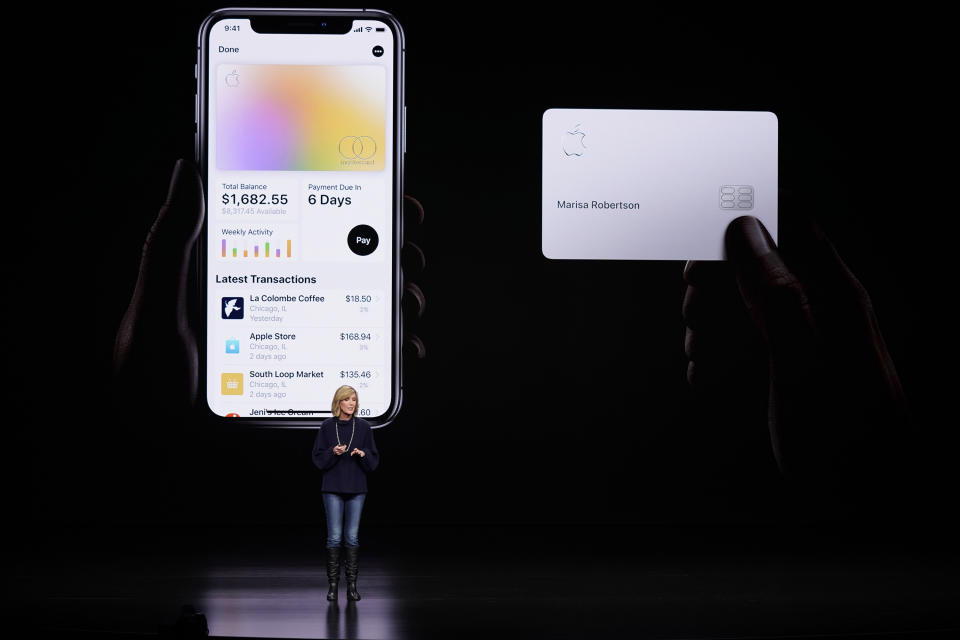The Apple Card's best feature is its privacy
Apple's (AAPL) new Apple Card credit card has finally arrived. Available to select customers now, and set for widespread rollout later this month, the Apple Card is the first credit card from Apple, and is further evidence of its plans to diversify its revenue streams outside of the iPhone.
The card differentiates itself from other major credit cards thanks to Apple's innovative user interface, which helps consumers understand overall spending, purchase habits, and more.
But one of the Apple Card's biggest selling points? Its privacy and security features.

Keeping your data private
Apple has staked its reputation on ensuring that its products are more secure and offer greater privacy than its peers, and the Apple Card is no different.
Like most credit card apps, the Apple Card app provides you with a list of recent transactions. But those other cards can make understanding that information difficult and confusing, making it hard to follow even your most recent purchases.
The Apple Card, however, breaks down your transaction data to be as readable and easy to understand as possible. In fact, Apple displays an image of the store where you made your transaction, as well as a map pointing to the establishment's location.

But Apple isn't looking at your transaction information. The company has specifically stated that all transaction data goes directly to the card's financial partner, Goldman Sachs (GS). Apple says it will never know what you bought, how much you spent, or where you made your purchase.
What's more, Apple and Goldman have agreed that Goldman won't use your transactional information for ad sales, a common practice in the credit card industry.
Mastercard (MA), which will support the Apple Card's global payments network, will, however, share anonymized and aggregated user data, scrubbed of personally identifiable information, which means it can't be tied to a specific Apple Card. Most credit card companies use a similar method of data collection.
Security is key
Apple pushes security as one of the most important aspects of its products ranging from the iPhone to the Mac, as a means to help distinguish itself from the likes of Facebook (FB) and Google (GOOG, GOOGL), which have run into security issues, and continue to deal with questions surrounding their privacy practices.
And Apple is doing the same thing with its Apple Card. In order to make a payment using the card, you need to use either Face ID or Touch ID. This ensures that you, the phone's owner, are the one making a payment and not someone else, like, say, your kid.
Transactions also require the use of two different numbers: No. 1 — Your unique card number stored in your iPhone's Secure Element, which serves as a security feature for Apple Pay, and No. 2 — A one-time dynamic code generated for each transaction. If those two numbers don't match up, your transaction won't go through.
The company has also set up three different credit card numbers for the Apple Card. There's the digital number for your virtual Apple Card, a number for the physical Apple Card, and a third number you can use on websites that don't accept Apple Pay online.
Have your card information stolen? No worries, you can request a new one in an instant from within the Apple Card app.
The physical Apple Card is essentially a blank slate. The only information on the laser-etched, titanium card is your name and some branding logos — there's no card number or security code. Apple says this makes it harder for your information to be stolen.
The card has no yearly fees and offers 3% cash back on Apple product and app purchases, 2% cash back on Apple Pay purchases, and 1% cash back when using the physical card.
More from Dan:
Email Daniel Howley at dhowley@yahoofinance.com; follow him on Twitter at @DanielHowley.
Follow Yahoo Finance on Twitter, Facebook, Instagram, Flipboard, SmartNews, LinkedIn,YouTube, and reddit.


